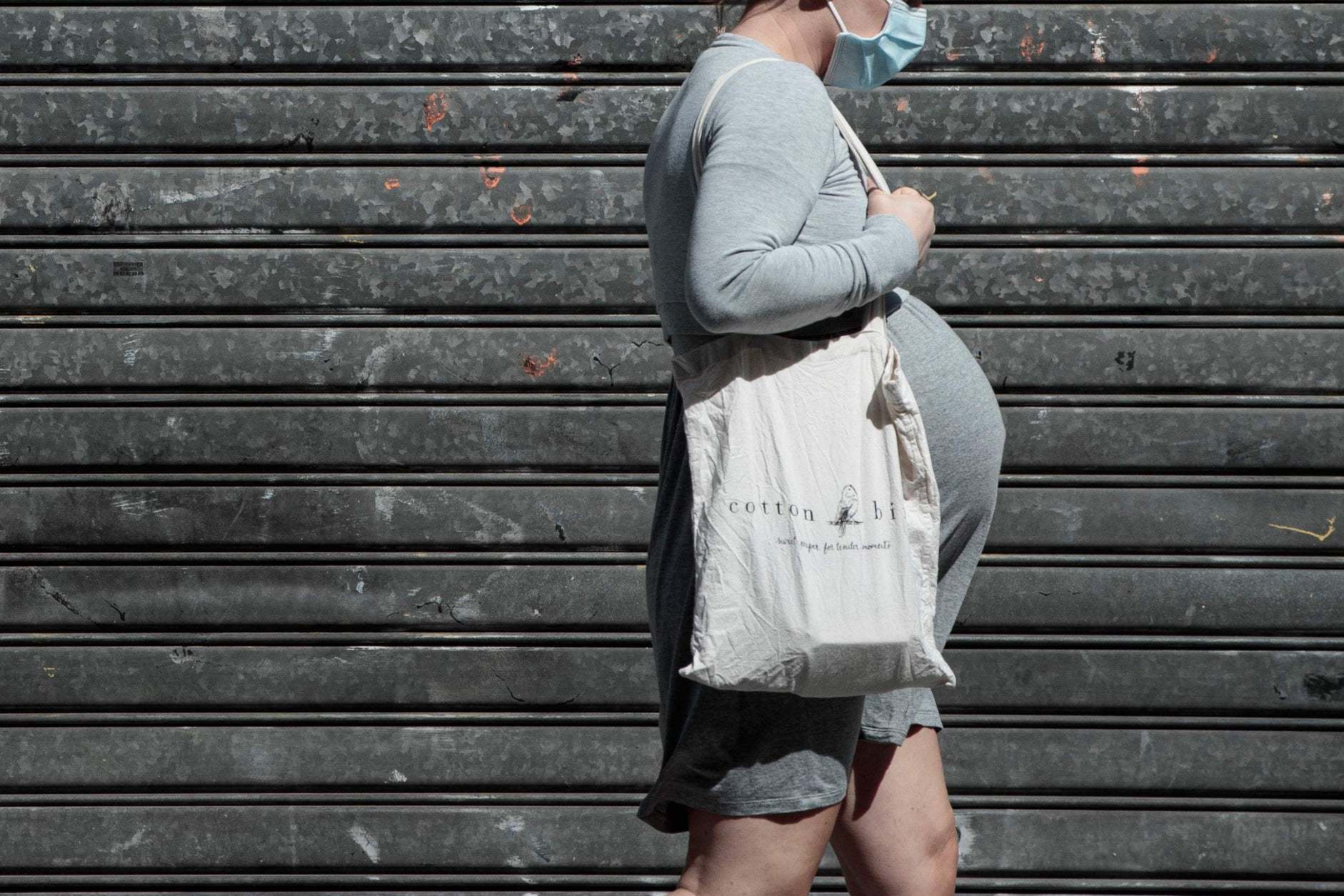Rise in number of women wrongly denied maternity pay since Covid, charity warns
Exclusive: Enquiries to pregnancy advice line rises by 28% since pandemic

Rising numbers of pregnant women and new mothers are being denied their maternity pay entitlement in the wake of the pandemic, new figures show.
Maternity Action, a pregnancy charity, says it has recovered more than £1m for women subjected to pay discrimination, but is warning that many more expectant and new mothers are losing out on income.
Campaigners blamed the problem on the government’s “woeful” inability to introduce proper guidance for pregnant women and employers during the Covid crisis.
The £1m figure, shared exclusively with The Independent, comes from 250 cases stretching from August 2020 to October 2021, in which the charity’s legal team supported women in maternity pay discrimination cases.
It found enquiries to its helpline about state maternity pay, maternity allowance, sick pay and other benefits shot up by 28 per cent in the wake of the pandemic.
In the 14 months leading up to March 2020, when the pandemic hit, the charity received 1,626 calls involving such issues, while in the 14 months since April 2020, there were 2,075 enquiries of this kind.
Rebekah, a trainee nurse who fell pregnant during the pandemic, said her employer incorrectly informed her she would not meet the requirements for occupational maternity pay.
"Work told me they were not going to pay me and didn’t give a reason,” she said. “I had a newborn and a chronic illness and it was extremely stressful. I felt like I lost the first three months of my maternity leave. I felt like I was at work, checking my emails several times a day.”
Rebekah, who did not want her surname used, explained she was forced to shield for a great deal of the Covid crisis due to suffering from severe autoimmune disease. The financial strain of being denied maternity pay had “immense” repercussions on her family, the mother-of-one added.
“I was so emotionally exhausted by the whole thing I thought about stopping the case because I was struggling to cope,” she added. “I contacted Maternity Action, who took on my case and after four months of calls and emails with their lawyers, my employer agreed they would pay me all my backdated pay.”
Maternity Action, which launched its legal support service in August last year, only has the resources to help one in eight callers to its helpline, which means the charity believes the “true scale” of the issue to be far worse.
Stephanie, who was made redundant while pregnant, was blocked from getting the Statutory Maternity Pay she was legally entitled to, due to her employer refusing to sign the forms she required to claim the money from the government.
She added: “I was depressed and worried about our finances. I was heavily pregnant and due to move house in a couple of weeks and I kept having panic attacks about how we would cope if I didn’t get my Statutory Maternity Pay.
“I contacted Maternity Action for help and they contacted my workplace for me and took that stress away. Luckily, my case was resolved within a matter of weeks and I received all the maternity pay that I was entitled to.”
Ros Bragg, Maternity Action’s director, said each day their helpline receives calls from women being wrongly refused the maternity pay they are legally entitled to from their employers.
“Pregnancy should be a time when women can focus on their family and their new baby,” Ms Bragg said. “However, the financial problems caused by difficulties resolving maternity pay can leave women focusing on their very difficult financial circumstances. The pandemic was already difficult. This was an additional stressful, wholly unnecessary, burden.”
She warned women should not need a professional lawyer in order to simply be paid what the law stipulates they are owed.
Ms Bragg said they advised many women struggling to get the maternity pay and benefits they were entitled to ahead of the pandemic. The problem stemmed from processing delays at the Department for Work and Pensions, employer confusion about rules and uncertainty among women about which public agency could help them, she added.
But the situation was greatly compounded by the public health crisis, the campaigner said, with women and employers struggling to negotiate complicated rules around furlough.
“Government guidance for pregnant women and their employers was woeful,” Ms Bragg said. “We waited nine months for any government guidance for pregnant employees, but no guidance was ever issued for employers in managing pregnant women.”
The dearth of guidance meant the government never told employers how to tackle furlough entitlements for pregnant women or how to approach paid maternity suspension – when you suspend pregnant women on full pay because you can’t provide safe working conditions.
Ms Bragg said: “The government’s earliest announcement advised pregnant women to self-isolate, so thousands of women were placed on statutory sick pay instead of receiving furlough or paid maternity suspension.
“Which means they lost a lot of money, which will amount to hundreds of thousands of pounds across the country. Every day I’m astounded at how many calls we take from women struggling to access even their most basic rights and entitlements at work.”
She noted issues raised by women also include poor health and safety at work, being unfairly made redundant, and unjustly being refused flexible working.
Joeli Brearley, chief executive and founder of campaign group Pregnant Then Screwed, said pregnant women and new mothers have been ignored throughout the pandemic due to men’s dominance in government decision-making.
“The specific needs of pregnant women and new mothers have been systematically ignored,” she added. “We have seen that in terms of financial policies, the vaccine, guidance of what you can and can’t do.
“We’re 19 months into the pandemic and pregnant women are still being overlooked.”
A spokesperson for the Department for Business, Energy & Industrial Strategy said: “Protecting and enhancing workers’ rights is an absolute priority for the government, which is why we increased our support for expectant parents during the pandemic, and have committed to establishing a single enforcement body to protect vulnerable workers – including pregnant women - across the UK.
“We have taken a range of significant action to protect workers’ rights since last year, including taking steps to protect the earnings of furloughed workers receiving maternity pay during the pandemic.”
Join our commenting forum
Join thought-provoking conversations, follow other Independent readers and see their replies
Comments



Bookmark popover
Removed from bookmarks